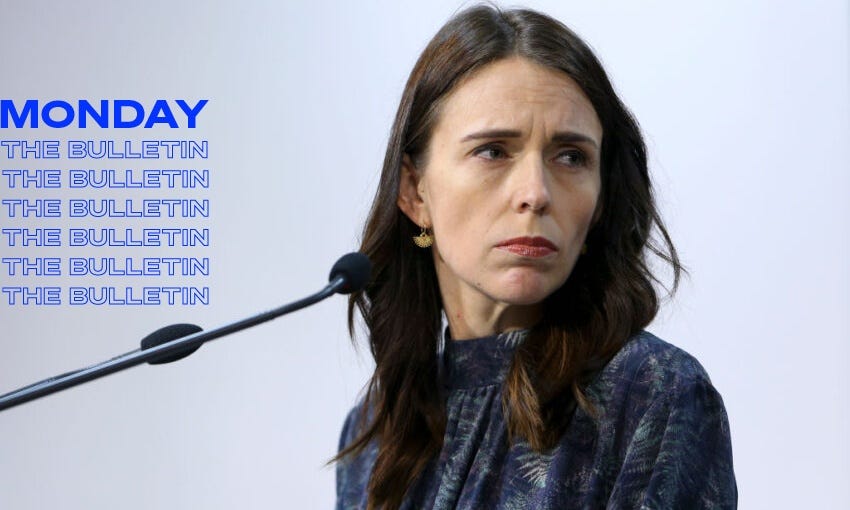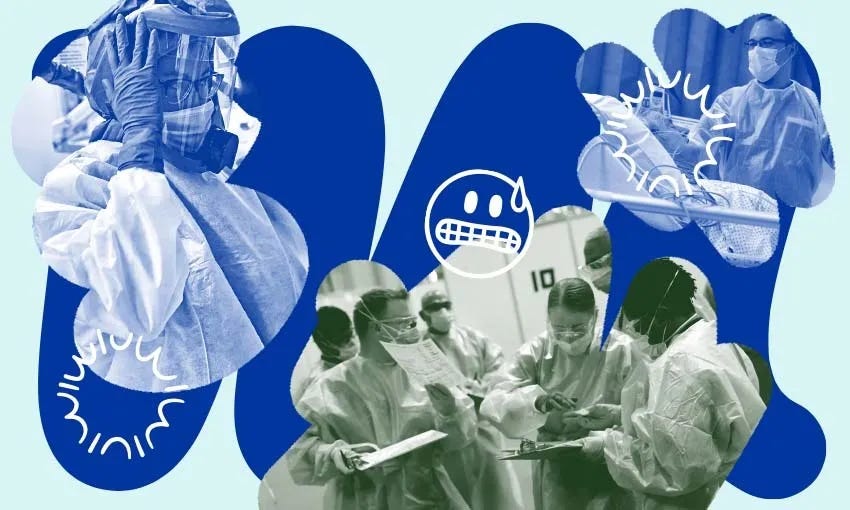Interview: Jacinda Ardern on 2022
The prime minister speaks with The Bulletin about the coming year and where she intends to focus her time beyond Covid-19
Mōrena and welcome to The Bulletin for Monday, December 6, by Justin Giovannetti. Presented in partnership with Z Energy.
In today’s edition: Luxon’s climate commitment; 88% vaccinated; Tiwai could remain open; but first, an end-of-year interview with the prime minister.
Covid-19 has worsened New Zealand’s inequality problem and tackling that needs to be a focus for 2022, according to Jacinda Ardern. (Hagen Hopkins/Getty Images)
Jacinda Ardern on travelling this summer. Aucklanders are facing renewed calls from health experts and iwi leaders to stay home this summer and avoid fuelling a possible Covid-19 surge, but the prime minister says that’s unnecessary and the new traffic light system is up to the challenge.
Looking to next year. Speaking with The Bulletin for an end-of-year interview, Ardern looked ahead to the issues she expects will dominate her schedule in 2022. But first comes the test of the next few weeks as the country enters a new phase in its response to Covid-19. Unlike the old alert levels, Ardern said that people now need to make their own choices about what’s safe for them, knowing the traffic light system will support their choices.
Just because you can travel, should you? “We haven’t left anything to chance, nor have we created a system reliant on other people to add additional layers for people to be protected,” said Ardern. “For us, we’ve always built that into the system. We want people to be able to make choices, in the security that we’ve thought through the impact of movements.”
“The protection now sits with the individual person. If you’re vaccinated, you’ve got a bit of armour you’re taking with you … my advice to Aucklanders would be to follow the rules and guidance, and make your plans accordingly.”
Does omicron change the rules for MIQ? In the few weeks since the government unveiled its timetable to relax border restrictions next year, the new omicron variant has upended government plans around the world. While little is still definitively known about the variant, it appears omicron is more infectious than delta. Currently, many New Zealanders returning from overseas are completing managed isolation in central Auckland hotels. Does the new variant present a strong argument to stop housing returnees in the middle of the country’s largest city?
“No, not at this stage,” said Ardern, adding that the government’s plan to reopen the border was designed with the possibility of variants in mind. “That was built into our system, because we’ve had a mind to how to last the distance in this pandemic”.
It can’t always be Covid. Next year will bring about a focus on inequality and climate change, says Ardern. The global pandemic is “this enormous thing,” said the prime minister, drawing a circle in the air, and it touches just about everything. It’s demonstrated the need to do more on housing and social inequality as the pandemic has worsened both situations. “We continue to do a lot of work on child well-being and for me the final piece of the puzzle is in the recovery. How do we make sure we are orientating ourselves for a recovery that is climate-focused and sustainable? In 2022, I anticipate I’ll be doing a lot of ongoing work in that space and we’ve already indicated the budget will be quite climate-focused as well,” she said.
The government had a busy work programme in 2021, but some aspects were delayed. Next year, expect it to pick up speed. The remaking of the health sector, with the shuttering of district health boards and creation of a new national system, would be a large work programme for any government. On top of that, Ardern said she expects to see much more of the resource management work coming through, as well as three waters, welfare changes, the housing programme and climate change.
“On their own, these would each be considered significant. We haven’t put a brake on any of them. It’s really hard amongst all of those to say which isn’t important. They are all important. All of them in their own way have been delayed or postponed, and we can’t keep doing that,” she said.
What’s on her Spotify end-of-year playlist? Unfortunately, Jacinda Ardern uses Apple Music, so she can’t join in on the Spotify fun. However, like many parents with children, her top artist would be “Disney”. If she could filter out the Moana and Frozen, there would be a lot of Lorde, Teeks and Hollie Smith. Podcasts? She’s the prime minister, she doesn’t have time for podcasts. But one glorious day in the future, years from now, she’ll be able to tune back into Criminal and the crimes that have been solved. “They are waiting for me. Have you listened to it? It's exceptional, it's right up my alley.”
This is the first in a series of end-of-year interviews with MPs over the coming weeks.
2021 will be remembered for the spread of delta, creating one of the most challenging stories—and commercial environments—in recent memory. It made us rely even more heavily on the support of our members. If you love what we do, please consider donating today. Want another way to support us? Invite your friends and whānau to subscribe to The Bulletin and keep them across Aotearoa’s biggest stories.
Luxon signals that National wants to be a climate leader. Bridie Witton reports for Stuff that the new National leader seems likely to break from his mentor John Key’s “fast follower” approach to climate change. By definition, followers are never leaders. As Witton writes, he’s been critical of the government’s failure to actually cut emissions and his time at Air New Zealand shows a real engagement with climate action. The party’s climate approach flatlined under Judith Collins. There could be a sign today of how serious Luxon is about the climate when he unveils a new allocations of portfolios within the National caucus.
Woman accused of assaulting Jacqui Dean. Days after she was at the centre of a political storm between Judith Collins and Simon Bridges, MP Jacqui Dean was the intended victim of an attack with a blunt instrument, according to the Otago Daily Times. A woman faces charges and five years in prison. It’s been reported she tried to hit Dean with her car after an argument relating to their dogs. Dean wasn’t hurt and the attack isn’t believed to be politically motivated.
The Covid numbers: There are 77 cases in hospital and 7 in ICU/HDU. There are now 9,037 cases in the delta outbreak. 93 new community cases were reported in Auckland yesterday, 8 in Waikato, 3 in Northland, 1 in Whanganui and 1 in Canterbury. 26,957 people were vaccinated on Saturday.
The Spinoff’s Covid data tracker has the latest figures.
88% fully vaccinated. With the move to the traffic light system, a significant amount of reporting over the past week has been dedicated to those who aren’t keen on the new rules. Either business owners who are pledging to ignore the law or groups of protesters who promise to defy it. It can feel a bit overwhelming. So here’s a statistic that’s important to keep in mind: 88% of eligible New Zealanders are fully vaccinated and the country is likely to pass that 90% threshold very soon. Parliament is now 100% vaccinated. A hypermajority of people and businesses are getting on with life and doing the right thing, as Stuff demonstrated by heading out to Auckland’s bars at the weekend. So let’s focus on the positive for now.
The first story in a new partnership with Ngā Pae o te Māramatanga. Charlotte Muru-Lanning explored the history of the Māori Centre of Research Excellence. In 2002, Ngā Pae o te Māramatanga was launched as a cross-discipline home for Māori research and knowledge. Over the next 20 years the centre fought to establish and capture the value and potential of mātauranga Māori.
Tiwai smelter could remain open if aluminium prices stay high. RNZ reports that it could be a mixed blessing, maintaining hundreds of jobs in Southland that were supposed to disappear at the end of 2024, but adding millions of tonnes to New Zealand’s greenhouse gas emissions. A significant amount of the motu’s climate transition was based on using the power made available by Tiwai’s closure. Treasury documents show the smelter’s end date could now be delayed for years because aluminium prices are surging.
When will the world’s supply chains straighten out: a year, 18 months, never? You may have noticed an issue with Christmas shopping this year. It’s global. Supply chains around the world are struggling and it isn’t clear when, if ever, they’ll get working again. Furniture deliveries to New Zealand used to take four weeks, now they take six months. Dileepa Fonseka has looked at the situation for Stuff and found that no one has a good answer, but there might be positive signs. It’s a stunning read. Nearly all the systems that are part of global shipping have broken down in some way and it could take years to get them going again.
Got some feedback about The Bulletin, or anything in the news?
Get in touch with me at thebulletin@thespinoff.co.nz
Paul Trotman interviewed more than 110 people for his film. (Archi Banal)
Right now on The Spinoff: Chris Schulz speaks with a Dunedin doctor who asked 110 frontline healthcare workers how they were coping as the pandemic spread. Frankie Bennett argues now that assisted dying is legal, hospices must not block access like so many are. Connie Buchanan explains why it’s really not ideal to raise a kid on a staple diet of Reader’s Digests. Eric Trump from Dunedin on being named Eric Trump. Tara Ward interviews a New Zealander who made it to an audition for The Chase and still unclear what went wrong.
For a longer read today, how Covid-19 ends in New Zealand. As we approach two years since the start of the pandemic, a number of experts tell Newsroom what they expect will be our destiny with Covid-19. One of their conclusions is that for the first time in human history, we actually have a lot of control over how to end a pandemic:
“The New Zealand experience of managing the Covid-19 pandemic reinforces a number of key lessons. It shows that in the 21st century, pandemic outcomes are shaped by government action as much as by the characteristics of the organism.”
Despite a historic showing from Ajaz Patel, Black Caps face heavy defeat. A loss is likely today for the New Zealand team, but as The Observer reports, Ajaz Patel still pulled off something memorable. He became only the third bowler to pick up all 10 wickets in an inning in international cricket.
That's it for The Bulletin. If you want to support the work we do at The Spinoff, please check out our membership programme.







